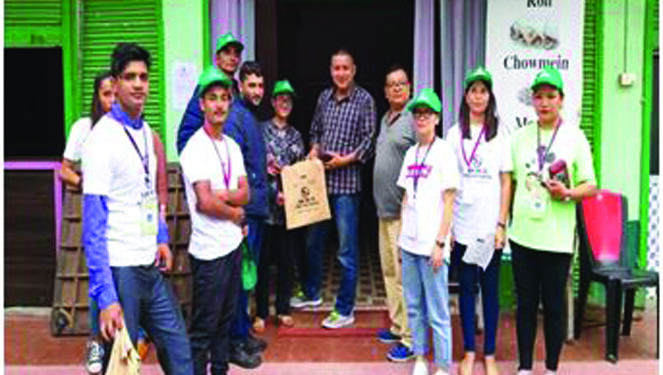
VINI MAHAJAN
Nearly eight years after the launch, Swachh Bharat Mission Grameen (SBM-G), the flagship programme of the Union government recorded another milestone – of 1,01,462 villages declaring themselves as open defecation free (ODF) plus.
#SBM-G has made India proud across the globe. Over one lakhs villages have declared themselves as ODF Plus under Swachh Bharat Mission –Grameen (Phase – II). It is a milestone in our journey to make our villages sampoorna Swachh.#OneLakhsODFPlus #SwachhBharatMissionGramin #India pic.twitter.com/TIlNBkH5wz
— Swachh Bharat I #AzadiKaAmritMahotsav (@swachhbharat) August 19, 2022
These villages are sustaining their ODF status and have systems in place for managing solid and/or liquid waste and they would continue on their sanitation journey as they work towards making their villages cleaner, greener and healthier.
- The top five performing states are Telangana, Tamil Nadu, Odisha, Uttar Pradesh and Himachal Pradesh
- Saying ‘NO’ to stubble burning, Ajmer Singh, a farmer of Sehbajpur village in Raikot block of Ludhiana district in Punjab has successfully installed a biogas plant
Nearly eight years ago, Prime Minister Narendra Modi launched the Swachh Bharat Mission from the ramparts of the Red Fort, with a vision to make the country ODF as a tribute to Mahatma Gandhi on his 150th birth anniversary.
One lakh ODF plus villages is no small achievement, given that the process of solid and liquid waste management is technical in nature, relatively new to rural India and is a second-generation issue.
A provision of toilets has led to the need to manage faecal waste. With portable water supply, more greywater is being generated that needs to be treated and reused; and with lifestyle changes and the use of packaged food products, the menace of plastic waste is rearing its ugly head in rural areas and that needs to be managed effectively.
Smt. Vini Mahajan, Secretary, DDWS, emphasized on conducting pan-India capacity-building activities for the successful implementation of ODF Plus components. It will give rise to a clean and prosperous India.#SwachhBharatMissionGramin #Swachhata #Gobardhan @mahajan_vini #OdfPlus pic.twitter.com/nfnd73G8yo
— Swachh Bharat I #AzadiKaAmritMahotsav (@swachhbharat) August 16, 2022
“And this is what the second phase of the SBM-G is about — to appropriately manage all types of waste that will not only make our villages clean, but also creating avenues for generating income for rural households and creating new livelihood opportunities, while fulfilling the requirements of the sustainable development goals.”
SBM-G has organised an orientation Workshop on SBM-G 2.0 to familiarize the officers who have been assigned SBM-G implementation in their states and UTs recently. The objective of this workshop is to illuminate the officers about all the verticals of SBM-G.@MoJSDDWS @MoJSDoWRRDGR pic.twitter.com/swW5dj697t
— Swachh Bharat I #AzadiKaAmritMahotsav (@swachhbharat) August 23, 2022
At the outset, DDWS had introduced intermediate stages in the process of declaring a village as ODF Plus, given that all villages may not fulfil all criteria under the verticals of biodegradable waste management (BWM), plastic waste management (PWM), greywater management (GWM) and faecal sludge management (FSM) before declaring a village as ODF Plus. In the ODF Plus – Aspiring category today are 54,734 villages in which all households and institutions besides having access to sanitation through individual household latrines, have arrangements for either SWM or LWM; those in ODF Plus – Rising are 17,121 villages which have arrangements for both LWM and SWM in addition to the criteria in Aspiring. Those that are declared ODF Plus – Model are 29607 villages which have all the above and where IEC messages are prominently disseminated and displayed.
This also translates into 99,640 villages across the country having arrangements for solid waste management; 78,937 having liquid waste management facilities; and 57,312 villages having both functional solid and liquid waste management plants.
The top five performing states are Telangana, Tamil Nadu, Odisha, Uttar Pradesh and Himachal Pradesh where maximum number of villages have been declared as ODF Plus.
 Saying ‘NO’ to stubble burning, Ajmer Singh, a farmer of Sehbajpur village in Raikot block of Ludhiana district in Punjab has successfully installed a biogas plant which utilizes crop residue and cow dung as feed to generate biogas, within his household premises. The family of 3 now avails of 3-4 cum per day of clean cooking fuel and organic compost for their fields, free of cost.
Saying ‘NO’ to stubble burning, Ajmer Singh, a farmer of Sehbajpur village in Raikot block of Ludhiana district in Punjab has successfully installed a biogas plant which utilizes crop residue and cow dung as feed to generate biogas, within his household premises. The family of 3 now avails of 3-4 cum per day of clean cooking fuel and organic compost for their fields, free of cost.

Meanwhile, when Richhawati, an active community leader and SHG member heard that the community biogas plant sanctioned for their Gram Panchayat (GP) in 2021-22 was being shelved owing to non-availability of community land and inadequate finance, she donated 2500 square feet of land that she owned for the project that would cater to the clean fuel needs of the community. The woman’s magnanimous gesture has set the wheels in motion for the construction of the Gobardhan plant that is now located in Salmatta GP in Sitarganj Block of Udham Singh Nagar district in Uttarakhand.
(The author of this article Vini Mahajan is the Secretary, Department of Drinking Water and Sanitation, GoI)










